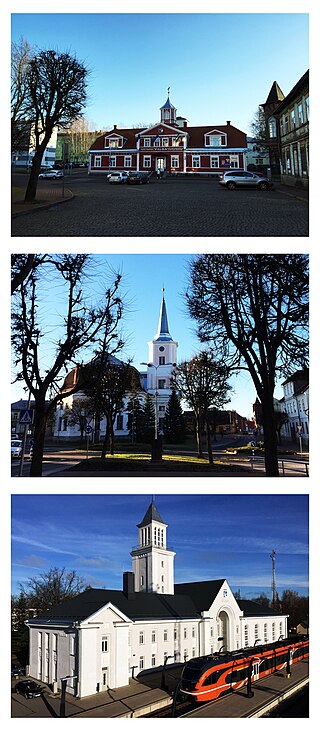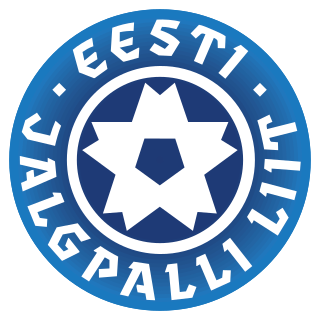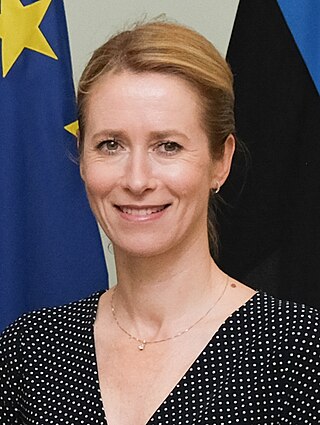Related Research Articles
The Republic of Estonia gained its independence from the Russian Empire on 24 February 1918 and established diplomatic relations with many countries via membership of the League of Nations. The forcible incorporation of Estonia into the Soviet Union in 1940 was not generally recognised by the international community and the Estonian diplomatic service continued to operate in some countries. Following the restoration of independence from the Soviet Union, Russia was one of the first nations to re-recognize Estonia's independence. Estonia's immediate priority after regaining its independence was the withdrawal of Russian forces from Estonian territory. In August 1994, this was completed. However, relations with Moscow have remained strained primarily because Russia decided not to ratify the border treaty it had signed with Estonia in 1999.

Valga is a town in southern Estonia and the capital of Valga County and Valga Parish. Until their separation in 1920, Valga and the town of Valka in northern Latvia were one town. They are now twin-towns. The area of Valga is 16.5 square kilometres and that of Valka is 14.2 km2 (5.5 sq mi). Their populations are respectively 12,261 and 6,164. On 21 December 2007 all border-crossing points were removed and roads and fences opened between the two countries with both countries joining the Schengen Agreement.

.ee is the internet country code top-level domain (ccTLD) of Estonia, operated by the Estonian Internet Foundation.

The Estonia men's national football team represents Estonia in international football matches and is controlled by the Estonian Football Association, the governing body for football in Estonia. Estonia's home ground is Lilleküla Stadium in the capital city Tallinn.

AS Eesti Liinirongid, operating as Elron, is a government-owned passenger train operator in Estonia.

Mart Laar is an Estonian politician and historian. He served as the Prime Minister of Estonia from 1992 to 1994 and from 1999 to 2002. Laar is credited with having helped bring about Estonia's rapid economic development during the 1990s. He is a member of the centre-right Isamaa party.

Mart Sander is an Estonian singer, actor, director, author, artist, and television host.
Postimees is an Estonian daily newspaper established on 5 June 1857, by Johann Voldemar Jannsen. In 1891, it became the first daily newspaper in Estonia. Its current editor-in-chief is Priit Hõbemägi. The paper has approximately 250 employees.

Pärnu Rannastaadion is a multi-purpose stadium in Pärnu, Estonia. It is the home ground of football clubs Pärnu Vaprus and PJK. The stadium was opened after reconstruction in 2016 and seats 1,501. It is located next to the Pärnu Beach and approximately 200 metres from the sea.

The Estonian United Left Party, informally Left Alliance, is a left-wing political party in Estonia undergoing reformation.

Estonia, officially the Republic of Estonia, is a country by the Baltic Sea in Northern Europe. It is bordered to the north by the Gulf of Finland across from Finland, to the west by the sea across from Sweden, to the south by Latvia, and to the east by Lake Peipus and Russia. The territory of Estonia consists of the mainland, the larger islands of Saaremaa and Hiiumaa, and over 2,300 other islands and islets on the east coast of the Baltic Sea, covering a total area of 45,335 square kilometres (17,504 sq mi). Tallinn, the capital city, and Tartu are the two largest urban areas. The Estonian language is the official language and the first language of the majority of the population of 1.4 million.

Tatjana Mihhailova-Saar, better known as Tanja or Tanja Mihhailova is a Russian-Estonian pop singer and actress. She was born in Kaliningrad, Russia, and has lived in Estonia from a very young age. Tanja has been a member of several bands in her professional career and has performed in several stage musicals. She represented Estonia in the Eurovision Song Contest 2014 with the song "Amazing" and finished in 12th place in the semi-final, failing to qualify.

The Conservative People's Party of Estonia is a nationalist and right-wing populist political party in Estonia led by Martin Helme. It was founded in March 2012 with the merger of People's Union of Estonia and Estonian Patriotic Movement. Its first leader, Margo Miljand, served as the chairman until 2013 when he was succeeded by Mart Helme. Its popularity remained low until late 2014, when the party began to draw supporters from the right; in the 2015 Estonian parliamentary election, it passed the electoral threshold and won seats in parliament for the first time. Since then, its support has grown, turning it into one of the largest parties in Estonia. In the 2019 Estonian parliamentary election, EKRE placed third, winning 19 seats in total. Mart was succeeded as party chairman by his son, Martin Helme, in July 2020.

Kaja Kallas is an Estonian politician and diplomat. She was the first female prime minister of Estonia, a role she held from 2021 until 2024, when she resigned in advance of her appointment as High Representative of the European Union for Foreign Affairs and Security Policy. The leader of the Estonian Reform Party since 2018, she was a member of parliament (Riigikogu) in 2011–2014, and 2019–2021. Kallas was a member of the European Parliament in 2014–2018, representing the Alliance of Liberals and Democrats for Europe. Before her election to Riigikogu, she was a lawyer specialising in European competition law.

Kersti Kaljulaid is an Estonian politician who served as the fifth president of Estonia between 2016 and 2021, and was its first and only female head of state since the country declared independence in 1918. She was also the youngest president, aged 46 at the time of her election.
Cultural Endowment of Estonia is an Estonian foundation which supports activities related to Estonian culture. The foundation was established in 1925 and re-established in 1994.
Events in the year 2022 in Estonia.
Estonian World is an online magazine dedicated to sharing news about the country of Estonia to an international audience, including non-Estonians within the country, and those of Estonian diaspora descent throughout the world.
References
- 1 2 "About us | Open Estonia Foundation". oef.org.ee. Retrieved 2 June 2020.
- ↑ "Open Estonia Foundation Announces Concord Award for 2009". oef.org.ee. Retrieved 2 June 2020.[ dead link ]
- ↑ "Kremlin calls Open Estonia Foundation a 'threat' to Russian security". Eesti Rahvusringhääling . July 20, 2022. Retrieved August 10, 2022.